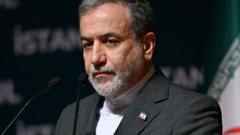In a dramatic policy shift, the Trump administration has lifted numerous economic sanctions imposed on Syria following years of civil conflict, a move that signals a significant change in U.S. foreign policy. This decision comes after President Trump's address during a visit to Saudi Arabia, where he expressed intentions to provide Syria with an opportunity to regain stability and prosperity.
U.S. Eases Sanctions on Syria: A New Chapter of Engagement

U.S. Eases Sanctions on Syria: A New Chapter of Engagement
The Trump administration's recent lifting of sanctions sets the stage for renewed U.S.-Syria relations amid challenges ahead.
Syrian citizens have welcomed the gesture, as over 90% of the population currently lives in poverty, according to the United Nations. The executive order signed by President Trump not only eliminates several sanctions but also sends a message to international entities that engagement with the Syrian government, now under the leadership of President Ahmed al-Shara, will be tolerated without fear of U.S. reprisals.
Nevertheless, certain sanctions remain beyond the president's authority to revoke, requiring Congressional approval to be permanently lifted. While this warming of relations is evident, U.S. officials have articulated expectations regarding how Syria should approach crucial regional issues, such as security measures and foreign relations, under its new administration. These initiatives, however, have been defined as broader goals rather than strict stipulations.
As the international community watches closely, the evolving dynamics in Syria could provide both opportunities and challenges, not only for the Syrian populace but also for U.S. foreign policy in the Middle East. As history demonstrates, the road ahead may still be fraught with complexity.
Nevertheless, certain sanctions remain beyond the president's authority to revoke, requiring Congressional approval to be permanently lifted. While this warming of relations is evident, U.S. officials have articulated expectations regarding how Syria should approach crucial regional issues, such as security measures and foreign relations, under its new administration. These initiatives, however, have been defined as broader goals rather than strict stipulations.
As the international community watches closely, the evolving dynamics in Syria could provide both opportunities and challenges, not only for the Syrian populace but also for U.S. foreign policy in the Middle East. As history demonstrates, the road ahead may still be fraught with complexity.




















